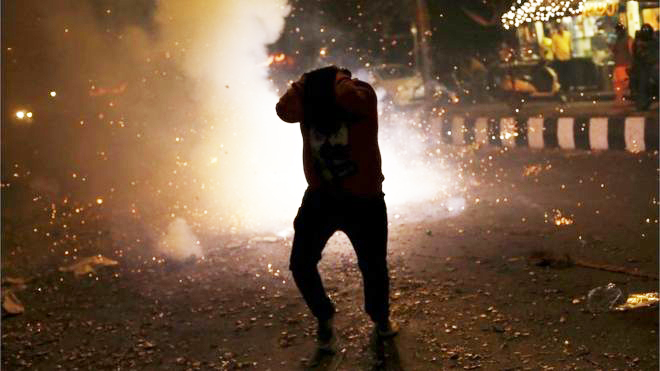Diwali without crackers in Delhi
The rising levels of air pollution have resulted in re-imposition of the ban on the sales of firecrackers in Delhi-NCR.
For Aastha, every year Diwali means staying indoors and keeping the nebulizer handy. “As someone who has asthma since childhood, Diwali has never been fun for me.”
Aastha, a resident of Kolkata, said, “There is no limit during Diwali, the noise seems to be never-ending and the roads are filled with the firecrackers waste.”
Firecrackers cause an immense level of air pollution and the data provided proves it. In the latest report named Apocalypse, published by Greenpeace India in 2017, it has been concluded that deaths due to air pollution in India are only a fraction less than the number of deaths caused by tobacco usage.
The Global Burden of Disease (GBD), a comprehensive regional and global research program which includes 500 researchers and 50 countries, has estimated that 3283 Indians died per day due to outdoor air pollution in India in 2015, making the potential number of deaths due to outdoor air pollution in India in 2015 to more than one million.
“Air pollution is a national public health crisis as almost none of the cities have bothered to keep air pollution in check, making them unliveable. We are facing an apocalypse right now due to un-breathable air, yet authorities are laying a deaf ear to the numerous scientific reports that have set alarm bells ringing,” said Sunil Dahiya, campaigner, Greenpeace India.
Last year, smoke from crackers raised air pollution to dangerous levels, with cracker debris littering the roads and several elderly people and animals suffering from anxiety attacks.
According to the Supreme Court (SC) of India, Diwali is celebrated for around five days, and in those five days, around 1 million kilograms of firecrackers are used every day.
Keeping this alarming level of pollution in mind, the bench of Justices A.K. Sikri, A.M. Sapre and Ashok Bhushan passed a verdict on October 9, 2017, to re-impose the ban on the sales of firecrackers till November 1, 2017. The decision was taken earlier in November 2016, based on a petition filed.
The earlier decision taken in November was protested by traders, and on September 12, 2017, a group of traders pleaded for few modifications to the ban imposed.The traders got back a temporary license on the sales of firecrackers in Delhi-NCR after the plea.
Shreya, a postgraduate student of Delhi University said, “I stay in Pritampura and Diwali celebrations in my area starts as early as one week before Diwali. You can hear crackers bursting 10 days before the occasion. This time I haven’t heard a single sound of cracker in my area.”
Along with air pollution, firecrackers also result in substantial noise pollution. According to the experts, the high decibel noises of the firecrackers may cause stress, annoyance and hearing loss. Therefore, in an attempt to control the decibel levels, West Bengal Pollution Control Board has published an order prohibiting the use of firecrackers producing sound over 90 decibels.
Similarly, the Home Ministry of Madhya Pradesh has announced a ban on manufacturing, sale and use of crackers which generate high-decibel sound.
In order to spend an environment-friendly Diwali, one can opt for ‘green firecrackers’ made of recycled papers and contains minimal amount of chemicals.
Debating around
Among the ones who are against this decision, are the salesmen and small business owners. The fire cracker salesmen, who have already been hit by demonetisation last year, are now agitating against this recent ban imposed.
Arshad, a fire cracker salesman in Kolkata, when asked about the ban in Delhi said, “Ban on fire crackers anywhere is not justified. This is our livelihood, whole year we prepare crackers and wait for this festival. The court asked them to sell after November 1, who is going to buy crackers after Diwali? Last year demonetisation created troubles and now this new rule.”
Hemant, the vice president of Save Green, a Non Governmental Organisation, said, “People are forgetting about the real issue. It is the pollution at large and not just pollution from fire crackers. The main source of pollution is the vehicles, which is being easily ignored by public. Banning is not a solution, there must be several people who would have already bought the firecrackers and the new rule doesn’t s stop you from bursting one.”
“If the larger good is taken into account, then the ban should be imposed throughout the country and not just in one state.”
This re-imposition of the ban has become a debatable topic over the internet as well. As soon as the verdict came, the online reactions started flooding the newsfeeds. Twitter was filled with opinions and judgements. While many hailed the decision, there were also a lot of them who expressed their discontent with the regime.
On one hand, people are demanding their right to breathe, while, on the other, there are some who still laments on a perfect Diwali without firecrackers.
SC bans fireworks on Diwali? A full ban? What’s Diwali for children without crackers?
— Chetan Bhagat (@chetan_bhagat) October 9, 2017
Ban on firecrackers may just be the best thing to happen to Diwali. Let us reinvent Diwali with lights without sound and smoke. ?⭐️?✨☀️
— Shivam Vij (@DilliDurAst) October 9, 2017
“I think it is important to realise the damage we have been doing to the environment for the sake of our enjoyment. Festivals like Dussehra, Diwali and the occasion of New Year can be celebrated even without fireworks,” agrees Kushagra Sirohi, a resident of west Delhi.
Last year, the rising level of smog in New Delhi forced authorities to close schools and ban construction activities after Diwali.
Though there have been several campaigns appealing people to give up bursting crackers, the city has been struggling with its worst air pollution for two decades, and it is yet to unfold the consequences of the celebrations this year.










